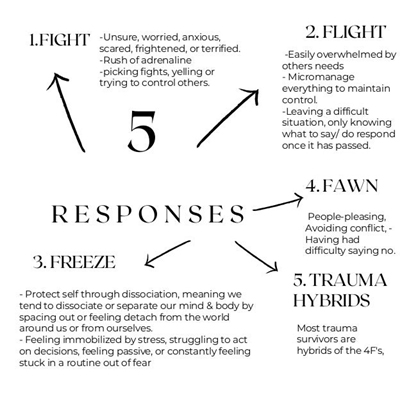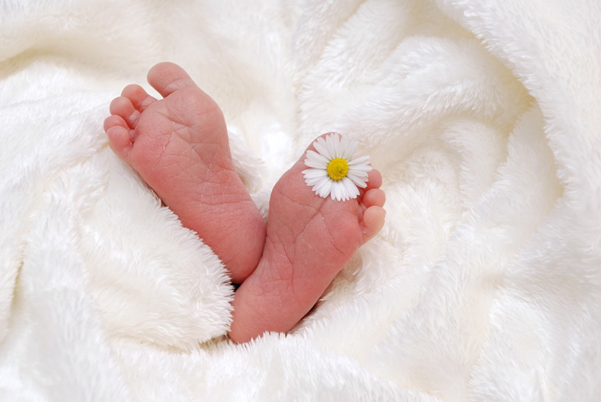If you experience anxiety or depression, you may move between the two experiences. Think of it like this, anxiety is what might happen when you feel your suppressed emotions trying to move up and out of your body. For many people, anxiety is the sensation that something bad is happening. It may not be bad, but it can feel bad. Anxiety tends to be more common when you lean more to the fight or flight response.
Depression, on the other hand is more like losing a connection with yourself. Perhaps feeling grief within emotional pain, not having your needs met. That can feel like having no feelings at times. You are more likely to feel the freeze response in this state.
What is Anxiety
Anxiety is excessive and uncontrollable anticipation of future perceived threats. Feeling anxious in certain situations can help us avoid danger, triggering our ‘fight or flight’ response. This is how we have evolved to keep ourselves safe. However, when your worries don’t go away, happen for no reason, are out of proportion to the situation or get in the way of your daily life, this may indicate that you have an anxiety disorder.
It is important to seek help if you feel that anxiety is interfering with your daily life. There are many effective treatments which can help to reduce or manage anxiety.
Are you or someone you know experiencing anxiety?
Below are some of the most common signs and symptoms associated with anxiety:
- Feeling ‘on edge’ or unable to stop worrying
- Restlessness or irritability
- Shortness of breath or breathing rapidly
- Difficulty concentrating
- Sleep disturbance, fatigue and exhaustion
- Physical reactions such as headaches, muscle tension, upset stomach
- Feeling lightheaded, faint, or dizzy
- Avoiding situations which make you feel anxious.
Depression
What is depression?
Depression is a low mood and/or a loss of interest in activities once enjoyed. It can last for weeks, months or even years and often interferes with a person’s daily life, making it hard to cope. Understanding and recognising the symptoms in ourselves or others is an important step in managing depression. There are many effective ways to treat depression and many individuals go on to lead meaningful and productive lives.
Depression can happen to anyone. You don’t have to face it alone. There is always help available.
Depression presents differently in different people, and it is not always easy to know if someone is experiencing depression. Some common symptoms are:
- Feeling sad, ‘flat’ or down most of the time (for two weeks or more)
- Losing interest in activities you used to enjoy (for two weeks or more)
- Change in appetite, sudden weight loss or gain
- Having problems sleeping or sleeping all the time
- Feeling tired or lacking energy and motivation
- Feelings of worthlessness or guilt
- Feeling angry or lashing out
- Difficulty concentrating or being indecisive
- Increased alcohol and drug use
- Withdrawal from social interaction
- Thoughts of suicide
Remember, there is always support even though sometimes it might not feel that way.
Visit your friendly GP initially, seek therapy or call:
http://www.suicidecallbackservice.org.au/phone-and-online-counselling/
1300 659 467
Sometimes Anxiety and Depression are like cousins. They are opposite energies. Anxiety is a high energy and Depression is a low energy. It is possible to experience both Anxiety and Depression at the same time.
Many of my clients experience Anxiety or Depression, or both. There are so many life events that can create or increase anxiety and depression and sometimes there is no obvious cause. We are all human beings doing the best we can in a world full of stimuli, expectations, challenges and emotional pain.
Often there is a direct link, for example, child abuse, abandonment or neglect, bullying at work, relationship breakdown, medical interventions and diagnosis or just sheer heartbreak.
At other times there is no apparent reason, and the experience is what it is and unique to that person.
You are not your anxiety.
You are not your depression.
You are you and you are unique.
Scott is a young person who started to feel intense anxiety in year 11 at school. In fact, he experienced panic attacks that were getting worse over time. There were some challenges at home with his parents and siblings and new relationships at school. He started to feel he wasn’t normal and didn’t know if he would ever feel normal again. He began arguing with his parents, dropping marks in tests and assignments and having trouble figuring out if it was worth staying at school. He was having trouble sleeping and then started to feel low and not interested in school or home or much of anything.
Scott’s nervous system was dysregulated from expectations from his parents and himself to do well. We worked slowly on settling his anxiety and seeing a future beyond school. We tapped into all the things he once loved and brought them to life again. He started to feel more confident with his exams and assessments and was arguing less with his parents and siblings. He released emotions he had stored for many years.
When Scott understood how his body and mind respond to stress and how he had much more influence on it than he thought he was able to feel some power come back into his life.
I can support you to:
- Calm and retrain your body
- Deal with your feelings
- Release stuck emotions
- Clear unprocessed experiences from the past
- Change harmful beliefs.
I will work with you and your other medical practitioners and support systems to look at the big picture. To address the energetic causes of your anxiety or depression and release them for a happier, healthier, relaxed and ‘chilled’ version of you.
You will learn how to release old emotions and the anxiety/depression attached to it that your body has been hanging onto for a very long time.
I will also support you to go easier on yourself, to feel safe with no judgement.
Life Events
There are many events in life that can increase anxiety and depression. Sometimes there doesn’t seem to be a direct link to the way you feel and that is OK. Our minds and bodies are complex, and everyone is different. We experience different childhoods, epigenetics, ancestral trauma, resources and health. You really can’t compare apples with pears or even the apples with apples.
In the information below I have focussed on Perinatal Depression and Anxiety. You will find more information on my other pages about events that can lead to anxiety and depression.
BIRTH
According to the Gidget Foundation, pregnancy and the first year of parenthood (the perinatal period) is a unique time and involves major changes in a person’s life. The challenges of this adjustment to parenthood are often underestimated within our society and cultures.
All expectant and new parents, including both mums and dads or partners, will have some good days and bad days. Ups and downs are expected and common. But when bad days become the norm, a parent may be experiencing perinatal depression or anxiety.
Perinatal depression and anxiety affect almost 100,000 expectant and new parents in Australia each year. Often, estimates for anxiety and depression are combined because many new parents experience symptoms of both. Sometimes, one may present more strongly than the other.
Depression alone affects up to one in ten women during pregnancy. In the first year after birth, it affects up to one in five women. Perinatal depression in dads or partners is not as well-researched. Evidence to date estimates about one in ten new dads are affected at some point from pregnancy through to the first year after birth. This rises to I in 5 if the mother is depressed. Dads’ roles have evolved in recent decades and some men can find this transition to parenthood challenging as they juggle all of the changes.
Mood disturbances, such as depression, tend to fluctuate more frequently and deteriorate more rapidly in the perinatal period than at other times. It is a vulnerable time. Perinatal depression is a recognisable and diagnosable medical condition. Genetic and prior life experiences can play a significant part in its development. Triggers can include biological factors (for example, genetics, hormonal changes), psychological factors (for example, personal or family history of depression or anxiety), and social factors (for example, lack of family support). It is treatable, and it is important to remember that recovery is possible with the right supports in place.
An episode of perinatal depression and anxiety can be mild, moderate, or severe. It is diagnosed when several of the following symptoms occur for more than two weeks, causing significant distress or impairment:
- Depressed mood, including feeling sad, empty or hopeless
- Crying for no apparent reason
- Loss of interest or pleasure in life
- Physical symptoms: (changes in appetite, headaches, sweaty palms, heart racing)
- Insomnia or excessive sleep
- Moving more slowly or finding it harder to slow down
- Loss of energy or fatigue
- Not feeling attached or bonded with your baby
- Feelings of worthlessness, guilt, feeling trapped
- Impaired concentration or indecisiveness
- Thoughts of death, self-harm or a suicide attempt
PERINATAL ANXIETY
Pregnancy and the first year after birth (the perinatal period) involve uncertainty, upheaval, and change.
In an environment where people try to retain as much control as possible over their lives, these new challenges are often anxiety-inducing.
It is expected and common for new parents to experience some worries and concerns. But if worries and fears start to feel overwhelming, or if they interfere significantly with daily life, a parent may be developing some perinatal anxiety symptoms.
When looking at statistics, some studies have found up to one in five women are affected by perinatal anxiety. Although perinatal anxiety in dads or partners is not as well-researched, similar rates are estimated for men.
Anxiety tends to fluctuate more frequently and deteriorate more rapidly in the perinatal period compared with other times. There are many reasons for this.
Triggers for perinatal anxiety can include biological factors (for example, hormonal changes); psychological factors (for example, negative thinking or the desire to be a “perfect” parent); and social factors (for example, loss of financial independence for a stay-at-home parent; no family support). Although it is common, perinatal anxiety is treatable – early intervention helps and recovery is possible.
If you experience several of the following symptoms for two weeks or more and they cause significant distress or impairment, an anxiety diagnosis may be given:
- Difficulty concentrating or focussing
- Feeling unusually restless
- Fear that something awful might happen
- Excessive and generalised worry
- Irritability
- Panic attacks
- Muscle tension
- Sleep disturbance
- Appetite disturbance
- Obsessive or compulsive behaviours
- Other physical symptoms such as heart palpitations, sweaty hands, stomach complaints
Remember
You can be uncertain and still do things that help you feel more in control.
You can have scary thoughts and be a wonderful mother.
You can be anxious beyond belief and still experience joy.”
Depression, anxiety, OCD, stressor and trauma-related disorders frequently occur together.
PTSD
Many symptoms of depression and anxiety overlap with the symptoms of PTSD. For example, in both PTSD and depression, you may have trouble sleeping or keeping your mind focused, lose pleasure or interest in things you used to enjoy, drink more alcohol or take more drugs, and avoid other people. It’s quite possible to experience PTSD along with depression or anxiety.






